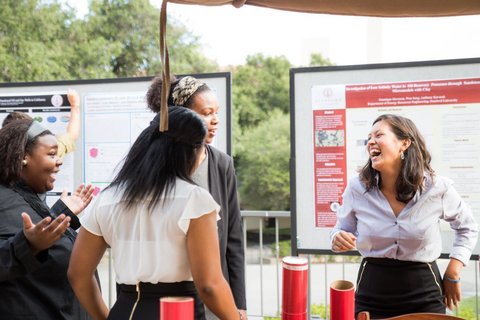About
Welcome from the Geophysics Department Chair

These are exciting times for Geophysics and our department. Our research and expertise are in high demand, and they are central for coping with challenges that humanity faces as the world's growing population puts increasing demands on energy and water resources and the environment, and as urban centers and complex infrastructure continue to expand in areas exposed to natural and human-induced hazards.We also continue to contribute to the advancement of the fundamental understanding of complex geosystems on Earth, other planets, and satellites in the solar system.
We believe in a quantitative understanding of Earth based on field measurements, laboratory experiments, and data analysis combined with numerical and analytical modeling. We employ both problem-driven approaches to research (e.g., geophysical hazards) as well as methodology-driven approaches (e.g., numerical forward and inverse modeling).
We value the diversity and the breadth of our research and teaching and strive to provide a collegial and nurturing environment for our students, postdocs, staff, and faculty. We are always open to ways to improve and be more inclusive of underrepresented groups. If you want to know more, please don’t hesitate to contact us.
Rosemary Knight
Geophysics Chair
Geophysics is a field that integrates geology, mathematics, and physics in order to understand how the Earth works. Geophysicists study Earth processes through a combination of laboratory experiments, computational and theoretical modeling, remote imaging, and direct observation. Research in the Geophysics Department at Stanford has both fundamental and strategic elements, addressing basic scientific and critical societal needs. This balance is a unique strength of our department - one that is strategically important for us to preserve, and one that that we express in our vision and mission statements. Our students benefit from this breadth of exposure and are highly sought after for rewarding careers in academia, industry, and government.
Our Department is leading research in many areas where geophysical expertise will be increasingly important for coping with challenges that humanity faces in the 21st century as the finiteness of energy and water resources becomes critical, as the world's growing population puts increasing demands on the environment, and as populations and complex infrastructure continue to expand in areas exposed to a spectrum of natural and human-induced hazards. Our role in advancing knowledge in these societally vital areas build upon our basic science advancing fundamental understanding of complex geosystems on Earth and other planets and satellites in the Solar system.
Our Vision
Understanding Earth. Benefiting Society.
Our Mission
To develop, apply and catalyze the adoption of advanced geophysical methods to further understanding of complex Earth systems and processes; and to train students to become future leaders in their fields. The research and training we do aspires to address critical societal as well as scientific challenges.

